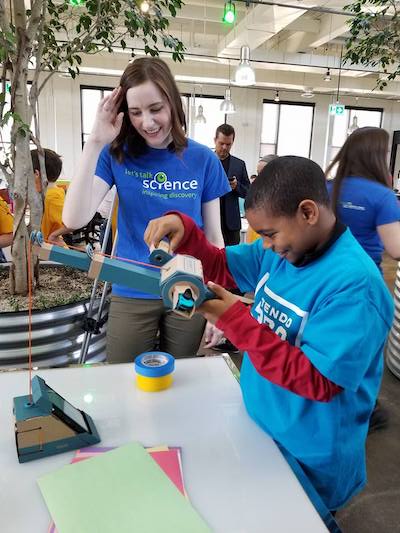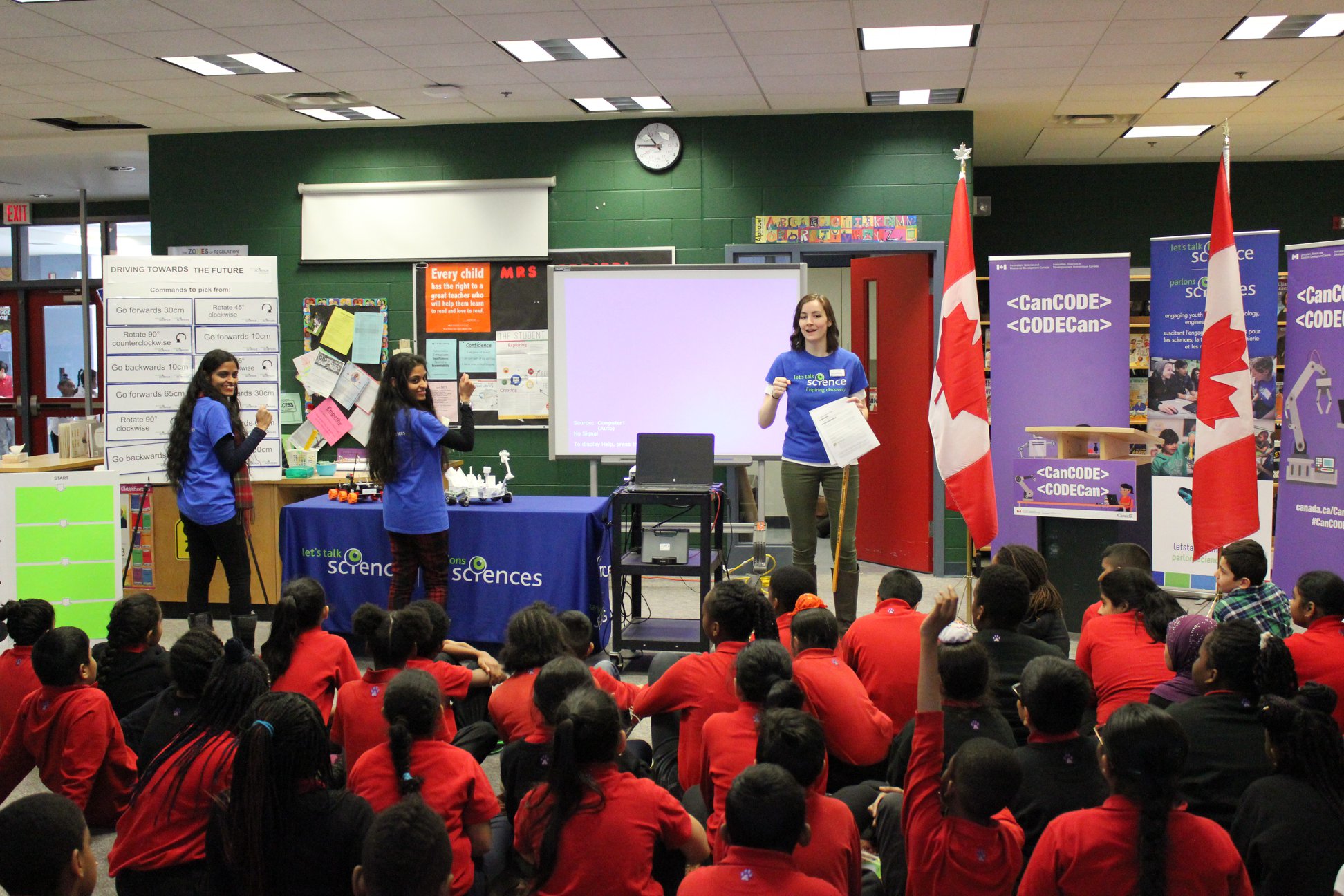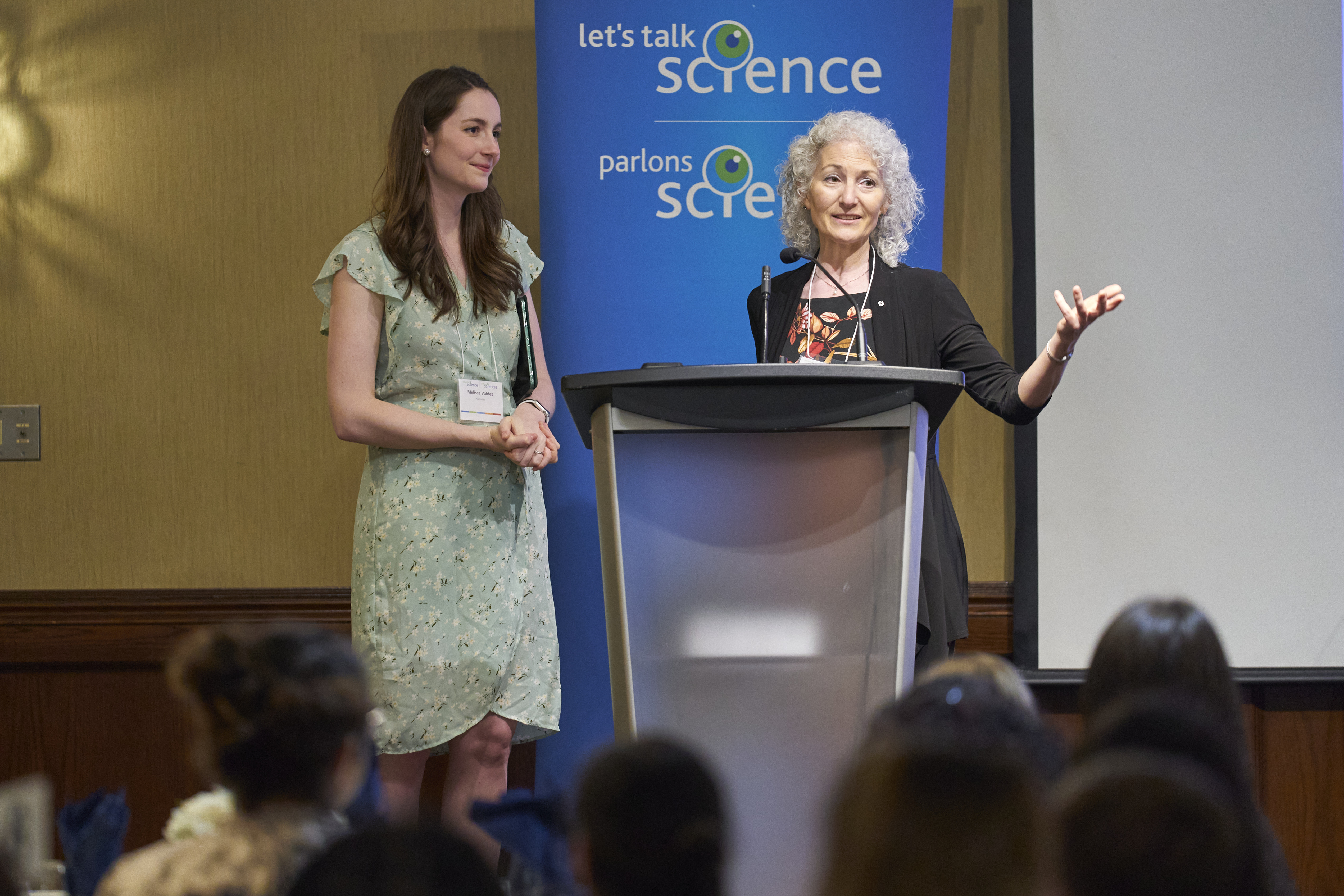Coming Full Circle: Melissa Valdez’s Let’s Talk Science Journey
Melissa Valdez has been on a STEM trajectory for a long time, ever since her parents encouraged her as a young student to explore the fields of math and science. “I still have memories of bringing my report cards home and telling my parents, ‘A in English,’ and they were like: ‘That’s great.’ Then I’d get an A in science, and they would go: ‘Oh! A in science?! That’s amazing!’” says Valdez. “They were just so supportive of me studying this.” Inside and outside of the classroom, Valdez engaged with science, discovering how fascinating it could be: “I have a memory of going to someone’s birthday party, and they had someone leading science demonstrations…dipping a balloon in liquid nitrogen, or lighting fire paper that goes up in smoke immediately, all kinds of fun stuff—I just thought that was so cool!” Valdez would go on to study physics for her undergraduate degree at the University of Windsor, and it was there where she first became acquainted with Let’s Talk Science.
“It was one of those moments in my life that was before and after,” Valdez says. “My life before Let’s Talk Science was studying and worrying about my grades. After Let’s Talk Science, I was sharing my passion and enthusiasm for science with my community and students. I was getting them excited about science and running hands-on activities with them and their teachers.” Valdez got in on the ground floor at the University of Windsor Let’s Talk Science Outreach site when it opened in 2013. She spent two years volunteering at the Windsor site, acting as a coordinator in her fourth year of studies, before moving to York University to complete her Master's in Physics and Astronomy. Valdez credits her time as a Let’s Talk Science volunteer for showing her the different pathways available to STEM majors outside of traditional research roles; “It really was a complete mindset shift about the things I could do with my science degree.”

At York, Valdez quickly became the site coordinator, where she recruited and trained new outreach volunteers, oversaw the Let’s Talk Science Challenge at York University in 2016 and 2017, hosted York University’s first Let’s Talk Microbiology symposium, and engaged thousands of children in hands-on STEM programming. In her final year of graduate school, Valdez started a partnership between Let’s Talk Science and the San Romanoway Revitalization Association (SRRA), a community centre located in Toronto's Jane and Finch neighbourhood, to help create a STEM-based after-school program. “After school, three days a week, we were there to do hands-on science with the kids,” recalls Valdez. “In order to do such heavy scheduling, we needed consistent volunteers. I partnered with the Faculty of Education at York—they had teacher candidates who needed to do community practicum placements—so they got their credits, and we got their expertise.” Post-graduation, Valdez took on a full-time role with Let’s Talk Science to continue running the after-school program and other activities in the Greater Toronto Area.

Through her six years volunteering and working for Let’s Talk Science, Valdez made many connections with other volunteers and staff, educators, mentors, and students. Each one touched her life differently and left an undeniable impact, from the experiential learning coordinator at the University of Windsor who brought Let’s Talk Science to the UWindsor campus, to the coordinators with whom she worked, to the countless students she met. The students from the afterschool program at Jane and Finch left an enduring impact: “I saw them multiple times a week, every week, for a year, so when I got my next job, I had to tell them ‘I’m not going to see you guys every day anymore,’ and I was emotionally devastated. The kids made this card. I have to keep it in a box at the back of a cupboard because if I look at the card—I just break down.” Even after Valdez moved on from her post at Let’s Talk Science, the program at Jane and Finch continues to this day, connecting with more and more youth each year.
Post Let’s Talk Science, Valdez took on roles at IBM and the Vector Institute in Toronto, working on various artificial intelligence projects. Now a technical consultant at a financial software company, Valdez continues to do talks and workshops, consult with educators and media companies, and join outreach events for children and youth. “My journey with Let’s Talk Science: as a volunteer, a coordinator, and then a staff member, those years were so formative for me because I was able to build the skills that I used at IBM and Vector, and still to this day.” In a full circle moment, Valdez is once again consulting with Let’s Talk Science to help establish a digital engagement strategy for the organization.
Looking forward, Valdez stresses the importance of STEM education, highlighting all the areas of our lives in which STEM is present, from new technologies such as artificial intelligence to health care policy to exploration and discovery. “If kids aren’t engaged in science, then they don’t go on to change the world by building new tools or going to space or exploring the bottom of the oceans,” says Valdez. “The best society is a scientifically informed society.” She hopes that by engaging with STEM programming from a young age, students will be able to build the confidence needed to live and work in a world of rapid technological progress. “In the next few years, we will see even more [technological advances],” asserts Valdez. “If the students feel that they are a part of the conversation today, I hope that in the future, they’ll be prepared for whatever is coming.”

Let's Talk Science is celebrating our 30th Anniversary and we are excited to continue making an impact in the lives of children and youth across Canada for another 30 years - or longer.
Join us in shaping the future by contributing to our fundraising goal of raising $30 Million in three years from industry, individuals and foundations through our Inspire – Educate – Innovate Fundraising Campaign. Together, we can continue to make a difference.